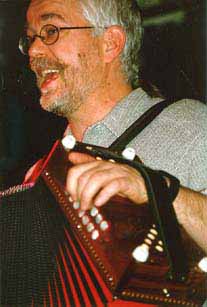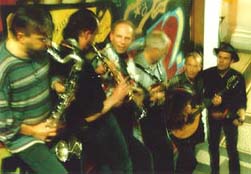Last issue in part one of the Jams-series, Jams' Northern German Traditions, we talked with Wolfgang and Jo about Northern German music and language traditions. This time it's about Jams themselves...
FolkWorld article by Michael & Christian Moll:
Prophets in their own Country
Jams on how to create powerful music out of German traditions
 Jams is one of the best known German folk bands; their musical quality is very high, and in live they are without doubt one of the best, liveliest and happiest folk acts on the German scene. It is indeed a bit strange that this night only 15 people came to see the concert in the old established folk club Iserlohn. But that is a problem of many German and international folk bands - being prophets in their own country...
Jams is one of the best known German folk bands; their musical quality is very high, and in live they are without doubt one of the best, liveliest and happiest folk acts on the German scene. It is indeed a bit strange that this night only 15 people came to see the concert in the old established folk club Iserlohn. But that is a problem of many German and international folk bands - being prophets in their own country...
"The idea of Jams is," explains the newest Jams member Wolfgang Meyering, "to take German tradition and music away from the (in Germany very popular, but musically very poor and by no means representative for German trad and roots music; the ed.) so called 'Volksmusik'; and to create our own music, which is always also for dancing. It is not music to think about but to feel for and dance to. And it is music with the German roots that we have. For Jo and me, it is mainly Northern Germany, but that does not mean we are playing exclusively Northern German music."
German folk music has often the image of being very intellectual, with critical lyrics to think about; and it is difficult to get the people to identify with this music. Jams try to avoid this: "Of course the lyrics have some intention, but the texts do not have the importance that they have in other bands; for us the most important thing is that they are good live songs." One of the reasons for this is that Jams are doing regularly German ceilidh dance events in Berlin, already since years. They are playing for real folk dance, not in traditional clothes - "people come as if they would be going to a disco - and often they also look like this. They come to dance, to meet friends, to 'club', to relax, just to have fun." Their experience to play for dances can be felt in their concert programme: It is very forward music, with lots of power, just to dance away, to have fun.
Jams have started already 18 years ago; their origins are in the lively folk music scene in East Berlin in the early 80s. In the beginning, Jams have experimented with diverse folk styles: Irish Folk, during the 'Deutschfolk' Revival also German folk, "but always in search for fun", they have played some Bluegrass, Klezmer, Balkan, Swedish etc. music.
Jo remembers: "As we had our first international contacts and successes, there was a kind of pressure on us. For Jams - coming from East Germany - the turning point was when the border opened, when you could go and play also in foreign countries. It was clear for us: We could not go and play Polskas to the Swedish, or Jigs to the English, or whatever - so we had to start to play German music."
 At the same time Jams thought of all those people "who always say: Yes, the Irish they have it easy to play trad music as they have a continuing tradition, and for the Swedish and Spanish and Italian it is very similar - but of course this is wrong; in those countries they have had the same problems to research and find the remains of their music traditions, and bring them to life again."
At the same time Jams thought of all those people "who always say: Yes, the Irish they have it easy to play trad music as they have a continuing tradition, and for the Swedish and Spanish and Italian it is very similar - but of course this is wrong; in those countries they have had the same problems to research and find the remains of their music traditions, and bring them to life again."
So Jams decided to get German stuff together, and to create their very own typical sound - and this Jams sound they have kept already for a long time, with several changes in their line-up.
Though the latest Jams line-up has changed the sound, it is still a typical Jams sound. "Jams has been known as an instrumental band", says Wolfgang. "When we recorded our first songs, people called Jo and said: I have heard some music that sounded like Jams, but there were people singing - that can't have been Jams can it? So they have recognised the sound, but could not make a clou out of it as there were lyrics with it."
One of the reasons for Jams now having many songs in their repertoire is the joining of Wolfgang to the band. Wolfgang has sung for years in other bands - like the excellent Northern German band Spillwark from Emden. And the other Jams members also wanted to sing - also because in Germany you often need to have songs in your repertoire to satisfy audiences. "We know that we still can do instrumental music, and that people like Jams because of that - and we still do instrumental music as we are playing for dances. But it was clear for us: If we play concerts, we also want to sing; and so we do that."
Jams reject that there is no good German material available: "There is enough great stuff, many great melodies, great songs - you just have to look for it. It is the same as for the Swedish or Italian - they have done research, compiled archives for their traditional music. There are lots of archives for folk dance and folk songs in Germany, too - you just have to search, and create something out of it, put ideas into it. You cannot present your audience the music like it has been played 100 years ago - you have to arrange it in a modern and innovative manner, and then people like to listen to it. Sometimes when we play at festivals, people come up and ask: Wow - that is possible? Many people just think it is impossible to have good German folk music - but it works!"
Line-Up:
Jo Meyer: Melodeon, Mandola, Vocals - Wolfgang Meyering: Mandola, Mandolin, Mandocaster, Vocals - Andreas Wieczorek: Sax, Percussion, Vocals - Holger Lattke: Sax, Clarinetes, Vocals - Michael 'Wki' Waterstradt: Double-Bass, Vocals - Snorre Schwartz: Drums, Vocals
Photo Credit: All Photos by The Mollis
Jams' latest CD: Fisch
Also recommended: Spillwark's new album (with Wolfgang Meyering) 'Sien Kurs' - reviewed in this issue
More Infos/contact for bookings: Jams' Website e-mail Jo Meyer.
And - if you have not yet - read also part 1 of the Jams series, 'Jams' Northern German Traditions'
Back to the content of FolkWorld Articles & live reviews
To the content of FolkWorld online magazine Nr. 4
© The Mollis - Editors of FolkWorld; Published 5/98
All material published in FolkWorld is © The Author via FolkWorld. Storage for private use is allowed and welcome. Reviews and extracts of up to 200 words may be freely quoted and reproduced, if source and author are acknowledged. For any other reproduction please ask the Editors for permission.
FolkWorld - Home of European Music

Layout & Idea of FolkWorld © The Mollis - Editors of FolkWorld
 Jams is one of the best known German folk bands; their musical quality is very high, and in live they are without doubt one of the best, liveliest and happiest folk acts on the German scene. It is indeed a bit strange that this night only 15 people came to see the concert in the old established folk club Iserlohn. But that is a problem of many German and international folk bands - being prophets in their own country...
Jams is one of the best known German folk bands; their musical quality is very high, and in live they are without doubt one of the best, liveliest and happiest folk acts on the German scene. It is indeed a bit strange that this night only 15 people came to see the concert in the old established folk club Iserlohn. But that is a problem of many German and international folk bands - being prophets in their own country...
 At the same time Jams thought of all those people "who always say: Yes, the Irish they have it easy to play trad music as they have a continuing tradition, and for the Swedish and Spanish and Italian it is very similar - but of course this is wrong; in those countries they have had the same problems to research and find the remains of their music traditions, and bring them to life again."
At the same time Jams thought of all those people "who always say: Yes, the Irish they have it easy to play trad music as they have a continuing tradition, and for the Swedish and Spanish and Italian it is very similar - but of course this is wrong; in those countries they have had the same problems to research and find the remains of their music traditions, and bring them to life again."